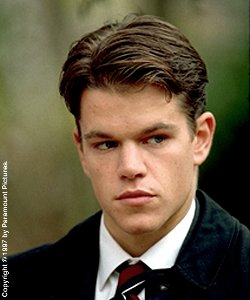

|
|---|
Synopsis: Rudy Baylor (Matt Damon) plays a newly graduated lawyer, who becomes involved in a typical "little guy vs. big guy" suit against a powerful insurance company who has deliberately allowed a woman's son to die of leukemia rather than honor her valid claim for medical coverage. Rudy also gets involved with a young battered wife (Claire Danes), and tries to help her out of her marriage as well as save her life.
Review: Let's begin with the entire objective of a movie: to present a situation for the main characters that involves a struggle of some sort, whether it's man against man, man against nature, or man against himself. As the story unfolds, the characters are faced with dilemmas, twists and turns, and other sorts of moral or ethical issues that blur the line between the character's (and our) impressions of right and wrong, good and evil, or other expectations we may have had about the situation. In the end, we expect characters to learn something about themselves or life in general, because life is full of paradoxes; it's not always cut and dry how things are, since there are many perspectives, and... well... life just isn't that simple.
...unless you're the filmmaker for The Rainmaker. Oddly enough, I wasn't surprised that this was directed by Francis Ford Coppola, who has simply fallen apart as a director over the past ten-plus years. Yes, he did The Godfather, but he also did such flops as Jack, Bram Stoker's Dracula, Tucker: The Man and His Dream, Captain Eo, The Cotton Club... But, back to The Rainmaker, the main problem with the movie is that it essentially stacks the deck in its favor, giving itself (and thus, us) no challenge whatsoever. There is no middle ground at all, no area for questioning, no conflict that gives us pause to think, or to even doubt or question what the outcome might be. The villian is simply evil with not even a hint at a reasonable explanation for their unlawful actions (blatently denying all claims to anyone who makes one). And the hero, a freshly-graduated-from-law-school lawyer, single-handedly takes on an enormous team of crack lawyers who've had many years of experience and precedence in defending against such actions. Oh, and he also finds time help a poor woman who is being continually beaten by her husband (who is so two-dimentional, we never even see his face).
The progression of events and circumstances paint the picture for how the entire movie is going to go: we see a painfully obvious victim of lukemia that is as riteous and pure as the driven snow. This, unlike the victim in The Accused, where we see that the victim is not so blantently the victim; Jodie Foster's character had some questionable qualities, and the nature of the conflict and trial were subject to various interpretations. In The Rainmaker, we are initially presented with an judge who was going to make things tough for our hero, which would have made the young lawyer's first time in court quite a challenge. But the judge conveniently dies and is replaced by a new judge who is against big companies also, so he becomes the young lad's advocate. Compare this with The Verdict, where Paul Newman's character is a flawed lawyer who has to overcome many personal challenges while fighting a very difficult case, against a hostile judge, against very competent lawyers, and has very few reliable witnesses to rely on. (That plot also revolved around a medical suit.)
The list of coincidences that favor the hero and relentlessly portray the villian as more and more evil becomes almost boring. You never expect anything other than a perfect hit every time. It's like watching the highlights of a football game: you get to see the long-run touchdowns, the successfully completed passes, and the tackling of the quarterbacks. If there were any difficulties that could have come the way of our hero, the script conveniently got them out of the way, paving a nice road to a successful and predictable trial.
The subplots in the movie are equally trivial and over-simplified, not to mention fundamentally unrealistic; it's not even worth talking about them.
Perhaps the most upsetting thing about this movie is all the other
reviews that have praised this movie so highly without even taking
any of the topics I've raised into account.
What ever happened to people's expectations of
a good trial film? If you want to really be intellectually entertained,
go rent The Verdict. If you like easily-digested, vaccuous
and spoon-fed plots and scenarios, The Rainmaker
is just the movie for you.
|
|
|---|